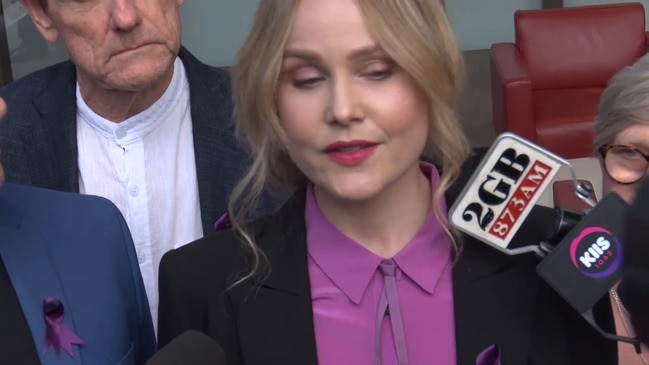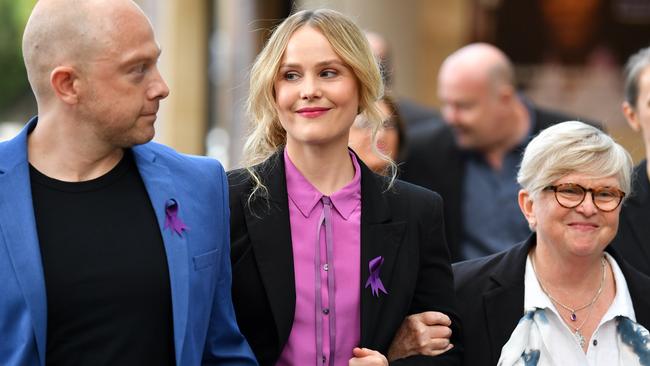I know better than Justice Wigney. And so do most women
Perhaps her story involving Geoffrey Rush seemed far-fetched to the judge, but aspects of Eryn-Jean Norvill’s evidence rang all too true for the countless women who have faced power imbalance at work, writes Sarrah Le Marquand.

“SO you know more than the judge?”
Somewhere amid the hysteria directed my way last Friday by the #FreeAssange fan boys after I dared suggest it was time for the self-pitying martyr Julian Assange to stop hiding and finally give his alleged sexual assault victims their day in court, this challenge made its way onto my Twitter feed.
But this particular barb wasn’t from the giddy Assange cheer squad, who, judging from the level of sophistication of their commentary, appeared to be comprised of Year 10 students killing time on the last day of school before the Easter holidays.
RELATED: Geoffrey Rush wins defamation case
No, the message above was in reference to comments I had made on the Today show earlier that morning expressing my dismay at the choice of words used by Justice Michael Wigney when handing down his ruling in Geoffrey Rush’s defamation case against The Daily Telegraph.
Speaking of Eryn Jean Norvill, the actor who testified late last year about Rush’s alleged behaviour towards her during a production of King Lear, Justice Wigney concluded she had been “prone to exaggeration and embellishment”.

Irrespective of his findings against The Daily Telegraph, and his apparent sympathy for Rush, it was — by any measure — a needlessly withering and tone-deaf assessment of a young woman who had shown immense courage in standing up in court in the presence of her senior peers, including of course, her Oscar-winning former co-star.
The judge also went on to question the apparent contradiction between Norvill’s evidence compared to statements she had made about the highly regarded — not to mention internationally famous — Rush when asked about him by journalists when promoting the play at the time.
RELATED: Support for actress Eryn Jean Norvill as Geoffrey Rush wins defamation case
As Justice Wigney sees it, the very public quotes that were published in media interviews were “entirely inconsistent” with her far more private account of how she alleges she truly felt about him.
It is an observation that reveals more about the judge’s understanding of sexual harassment than anything else.

Leaving aside the very real fact that it is common practice not only in the entertainment industry — but in many other workplaces — to offer a glowing character assessment of a powerful and senior colleague when put on the spot, the remarks are also telling in regards to Justice Wigney’s grasp of the power dynamics at the heart of sexual harassment allegations.
As Norvill told the court last October, she felt that Rush’s status as the star of the production made her fear she would not be listened to if she spoke up about his alleged conduct.
“I was not a priority in that show. I wasn’t the one putting the bums on seats,” she testified. “I think the consequences would have been catastrophic … Any tension between us, and conflict between us would have been disastrous.”
It is a nuance that may have been lost on Justice Wigney, but a sentiment that rings true with the many women — and, yes, also men — who have offered a brave face to the world even as they privately struggled with the unwanted advances of a senior colleague.
RELATED: A letter to my girls in the time of #MeToo
So do I know more than the judge? Why, yes I do — thank you for asking. And so too do millions of other women across Australia.
True, unlike Justice Wigney none of us were appointed to the Federal Court of Australia back in 2013. Most of us haven’t practised as a barrister for more than 20 years and even less of us have a CV including a period specialising in complex white-collar crime.

But what we do know is that sexual harassment is very rarely carried out by “bad” men. Those guilty of such behaviour are often very successful and otherwise impeccably well-mannered. Indeed, so often these otherwise good men are so highly respected and well intentioned that they don’t even realise their behaviour might be making the women in their orbit so deeply uncomfortable. (Sound familiar, Joe Biden?)
What we also know is that, determined not to be seen as a victim or forever known in the office as THAT girl, most women are reluctant to make a fuss and instead hope that hard work and quiet resilience will pay off.
We know that most victims of sexual harassment are afraid to speak up for fear of being portrayed as a liar, a gold digger, a nuisance, a liability. Hardly attributes that add up to career progression.
And we also know that it’s possible to have great respect for a senior colleague, and even hold them in great affection, while also wishing he would keep his bloody hands or “compliments” to himself.
RELATED: Men, we should learn from women’s discomfort
Ask any of the countless Australian women who have encountered a delicate but difficult power imbalance at work — particularly in the early years of their career — and the supposedly inconsistent aspects of Norvill’s evidence are not only too painfully familiar but alarmingly plausible.
What appears to seem far-fetched to Justice Wigney rings all too true to the many young women who have dared to come forward with workplace war stories of their own, only to be dismissed and patronised by those enjoying the advantages of power and position.
In the wake of last week’s ruling, there’s been some discussion as to whether the verdict will have a stifling effect on the #MeToo movement in this country.

Unfortunately, there’s nothing to debate. There is absolutely no doubt that Justice Wigney’s decision in the case of Rush v Nationwide News Pty Ltd (No 7) [2019] FCA 496 will deter other alleged sexual harassment victims from coming forward and will prove a serious setback to cultural change in Australian workplaces.
Whatever the merits or otherwise of the original story published in The Daily Telegraph in 2017, once the matter was brought before the court, and Norvill agreed to give evidence, this ultimately became a case of He Said, She Said.
And Justice Wigney opted to believe him. And, in the process, reaffirmed the pre #MeToo barriers that alleged victims have always battled when seeking acknowledgment, much less justice, in the judicial system.
RELATED: The #metoo movement has power to help us all
Just as the events set in motion on October 5, 2017, when various US media outlets published a damning account of Harvey Weinstein’s serial sexual harassment and set in motion the #MeToo revolution, the Rush verdict will trigger a similar contagion effect here — only in reverse.
One of the complaints waged by those cowering in the face of the long overdue societal changes ushered in by the #MeToo movement is that it’s a social change brought about through trial by media.
It’s a furphy, of course. Media organisations have no judicial powers. They don’t try cases or determine convictions but simply expose wrongdoings that may subsequently be brought to trial.
So there’s no such thing as trial by media. There is, however, such a thing as trial by judge. Maybe it’s time for a job swap.
Sarrah Le Marquand is the editor-in-chief of Stellar magazine and the founding editor of RendezView.
